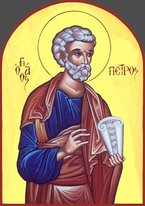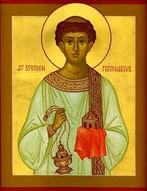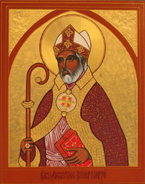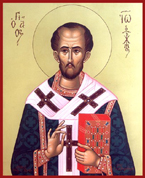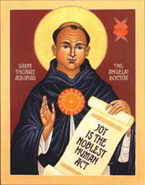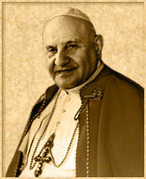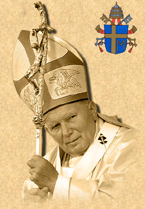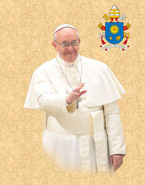|
St Augustine and the Christian’s Dual Citizenship Sherman Kuek, SFO Published in Catholic Asian News (August 2009 Issue) In adapting the satire written by Canadians Laurence Peter and Raymond Hull in 1968 - The Peter Principle - one may say, in the context of human involvement in national governance, that the higher one rises in the political ladder, the less one is able to achieve that which he had initially set out to do. For the individual politician, this may be because he has to spend most of his time focusing on efforts to retain his position rather than being fixated on human dignity and the common good. The higher he rises in the political ladder, the greater a proportion of his resources must be devoted to preserving his position. And thus, in accordance with the Peter Principle, the rise of individuals into political positions might mark the death of their initial ideals. THE DEFICIENCY OF SECULAR GOVERNMENT
If the above conjecture is true, then we can speak of the deficiency of secular government, which is populated by such individuals as those described above. But yet, despite such a deficiency, we live in a context today that calls for loyalty to king and country. With governments that do not always promote human dignity or the common good, can Christians be loyal to their king and country, and to God, both at the same time? Should they? Is it right that such undisputed loyalty without boundaries be attributed to the collective sensibilities belonging to people who would do whatever it takes to stay up there, governments often fraught with corruption and all but questionable motives? On this, the Christian tradition is not naïve. Different sorts of government systems exist in the world. Among many Christians, it is commonly held that liberal democracy is the political regime most consistent with Christian ideals. That notion, to be sure, is a myth, for even liberal democracy cannot help but be accompanied by various self-serving humanistic inclinations. This deficiency is often compounded by the political assumption of liberal democracy’s autonomy from the religious dimension. Of course, even theistic forms of governments entail their own challenges. For example, the dominance of a particular religious worldview in a government may mean the marginalisation of all other religious worldviews in a plural society. Therefore, for, say, Christians who exist as a minority community within a society which is governmentally dominated by a different religious worldview, true loyalty may be in question when the government becomes exacting in a way that requires the Christian community to compromise its religious loyalties. Thus, the Christian is often found to be caught in a tension of conflicting allegiances - to serve God, or to serve king and country? Thus, at one extreme, the problem with liberal democracy is that it ignores the existence of God all together. At the other extreme, theistic governments which embrace certain religious worldviews ignore the fact that their “god” exists among other “gods”. A TALE OF TWO CITIES A solution to this confusion of allegiances may be found through a recovery of St Augustine’s doctrine of the Two Cities, which suggests that God has segmented the created world into two dimensions which are distinct from each other, although not entirely separate. On the one side is the “city of God” that consists of all things supernatural and includes the Christian community. The city of God is governed by divine law and is more concerned with the direction of creation to eternal existence. On the other side is the “earthly city” that consists of all things political, such as the state government, the economy, social stratification, and the military. This latter dimension is to be subservient to the former as it serves the lesser purpose of the temporal order. Universal Christian political imperatives should not be derived from temporal considerations because the need for earthly government exists only as a reminder of man’s fallen nature. But at the same time, I am also not actually suggesting that the temporal order should find its governing principles from the spiritual order, for it has been established in a prior point of mine that even theistic governments present inherent deficiencies. Rather, the crucial point of this discussion lies in the assertion that secular governing principles should find their being in the reality that the present worldly state of affairs are a result of human fallenness, which as a consequence requires government to restore order in the temporal world. Whilst the way of the city of God does not directly dominate the temporal order, the latter finds resonance with the former in that the city of God promotes a greater dignity of human persons in its proper perspective. The city of God also possesses the capacity to prescribe limits to earthly authority for the purpose of upholding civil peace and moral order on earth. These two governmental worldviews also represent divergent values about human life, thereby further escalating the tension between those holding dual citizenships. Even if the values often look alike, one needs to look beneath the superficial expressions of these values in order to discern if they emerge from the same motivations. For example, it would be naïve to hold that the modern rendition of human rights can be grounded in the Christian understanding of human dignity when, in all likelihood, it arises from the egocentric nature of human fallenness. The embrace of human rights can lead one to conclude that it is one’s right to cause the expiration of his own life when he no longer is able to live with dignity, whilst it leads the other to conclude that life must be preserved at all possible cost because of its intrinsic dignity. The earthly city’s doctrine of human rights also fixates itself upon living the good life in the temporal order and neglects the greater desirability of the otherworldly concerns. In this respect, all temporal government must return to embrace its divine roots together with the noble motivations that accompany them. The two concepts of “Christian” government and “secular” government are not mutually exclusive. The concept of a secular government is not to be construed as being opposed to religious government, but rather, to eternal government. The government should be secular only in the sense that it is temporal and will one day be displaced by the eternal rule of Christ. THE TENSION OF ALLEGIANCE In considering how St Augustine’s doctrine of the Two Cities implicates upon the political arena of our nation, one must further pursue the issue of the tension of allegiance. Legitimate forms of earthly government can be constructed only when it is acknowledged that government is divinely instituted, that it is not a mere “human social contract”. And yet, the state itself is not expected to have a religious function, for its concerns are to be purely temporal. Indeed, the state legitimately commands the support of its citizens, soldiers and statesmen. But as has been earlier mentioned, the laws of the temporal government are also subservient to the laws of divine government in that the latter limits the former. Therefore it is vital that temporal governments legitimately demand submission of its citizenry only to the extent that the divine laws are not defied. The suggestion that temporal government submits to divine laws does not in any way imply that a particular nation should form a theocratic pattern of governance. It is certainly not within the scope of the state to enforce Christianity. But it does imply that the state should cultivate fear of God and God’s ministers, the rulers and governors of the state; not because it supports the cultivation of mass subordination, but because it is simply consistent with the divinely instituted design of human governance. It must also be recognised that the legitimacy of the temporal government can find its ultimate support for existence only in its acknowledgement of divine appointment. In other words, the state needs “proof” of its sanction by higher authority, and it is at this point that the state needs to understand the Christian imperative of its secondary prerogative in comparison with the divine government. Furthermore, it would be utterly illusive to presume that people’s beliefs and values have little or no political consequences. Hence, just as secular political inclinations dictate that spiritual considerations are not to interfere with political concerns, the patriotic Christian - in being consistent with his faith - must necessarily pledge his primary allegiance to the spiritual dimension of his citizenship. And in instances whereby temporal political demands stand in blatant defiance of the spiritual order, he must remain firm in his allegiance to the latter (which, in the first place, is responsible for according legitimacy to the existence of the former). It is only in such a manner of allegiance to God and then to the state that a citizen can be truly held as one acting for the greater good. However, a word of caution is in order. The priority of one’s spiritual citizenship must never succumb to the unreasonable conclusion of non-participation in the secular political order. Hence, a crucial point of reminder for the Christian citizen is the imperative of his involvement in the political life of the nation. Aristotle claims that the human person is inherently a “political animal”. In so saying, he is not suggesting that every member of society bears a responsibility to be a participatory politician. What Aristotle refers to is the community as a reference point for the individual, and that each community needs to have its life ordered on the basis of the common good. This process of ordering communal life may itself be termed “politics”, and responsible citizenship of a community logically implies that an individual would participate in this political process through his interaction with others in the community. Likewise, the similar principle applies for the larger context of national life. The onus rests upon the Christian community to understand the relationship between its faith and temporal politics, failing which the understanding of the community regarding the political arena would be wanting. The political actions of the Christian community must necessarily demonstrate a legitimate dynamics of theological understanding, for faith must give direction to politics. Therefore, this calls for both an active political participation from the nation’s Christian community and the cultivation of the discipline of theological reflection for the political direction of a nation.
0 Comments
Leave a Reply. |
Categories
All
Archives
December 2021
|
|
FOLLOW DEACON SHERMAN DEACON'S FORMATION FB GROUP
© 2021 Sherman Kuek. All rights reserved.
|

 RSS Feed
RSS Feed
